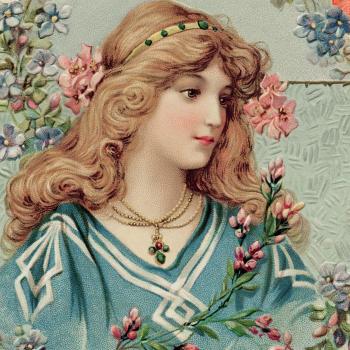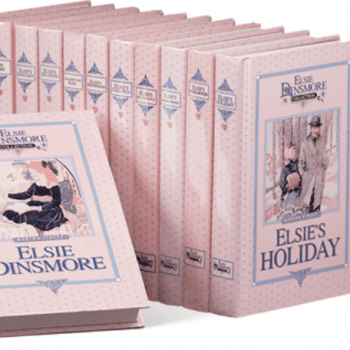So, most of the cat is out of the bag; Elsie nearly dies before the book wraps up. The last piece of the story involves Elsie’s extreme reluctance to do anything of a secular nature on the sabbath. Her only acceptable Sunday diversions are reading the bible and The Pilgrim’s Progress (a religious allegory). So, of course, when Horace asks Elsie to read him secular story on Sunday, she refuses, saying its against God’s law. Remember that Elsie has already run into problems with this, such as the time she would not play a secular song on the sabbath in the first book. Anyway, this time Horace works himself into extreme sickness, then after his recovery he punishes her until she is so distraught she falls into illness—all because he has this bizarre desire to see her submit to him in all things, no matter how small.
Over the course of six chapters Horace takes away all of Elsie’s freedoms including her correspondence with Miss Rose (remember the Christian friend she met in the beginning of book 1?), her travel privileges, even her Mammy, and then he threatens to sent her away to boarding school. He finally even leaves the house so as not to accidentally cave in and give her any sense of victory whatsoever. He promises to relent only when Elsie agrees to give up her obsession with placing God first, which she’s never gonna do.
Hilariously, the detail that sends Elsie over the edge into actual sickness is the mention of being sent to a Catholic boarding school. Elsie freaks out, saying, “They will try to make me go to mass and pray to the Virgin, and when I refuse they will put me in a dungeon and torture me!” Aunt Adelaide and even the author herself do very little to dispel the reader’s bad image of Catholicism, calling the religion “superstition”. I was raised a Catholic and this part just made me laugh.
The morning after the “Catholic scare,” Elsie is found feverish and weak, causing some family members to worry for her very life. And they are correct. She declines so far that she is actually pronounced dead at one point, until they figure out her heart still beats, barely. This crisis produces the long expected change of heart Horace needed. He decides to no longer make Elsie obey when it goes against her conscience. Great. She still has to unquestioningly obey all the other times of course.
The rest of the book is basically about how inseparable Horace and Elsie are now that they are both true Christians. Oh, did I mention Horace had a mini-conversion from whatever lackadaisical Christian he was originally? This book makes it clear there are right kinds of Christians and wrong kinds. Presbyterians get all the good adjectives, so they are obviously right. Catholics get bad adjectives, so they are wrong. The book does very little to elaborate on why this is so.
One thing that really got to me during the reading of this book was how assured the storyteller is of the themes she embeds in the story. I mean, I know I’m not sinning by reading, say, Memoirs of a Geisha on a Sunday. But to Elsie? There would be no question of the worldly, even carnal nature of my chosen entertainment. I doubt she’d approve of it for even a weekday, let alone a sabbath. Her certainty (and by extension the author’s certainty) makes me highly uncomfortable. I’m starting to realize how much I truly value honest discussion and the ability to think about things and change one’s mind. This story seems to actively encourage the opposite of that. I actually felt like I was upside-down reading some of this. It was so absolutely convinced of itself that I wondered if I’d fallen into a different reality. I literally took a break from reading for two days at one point. It was just so disheartening.
I thought the story had a lot of problems from the nitpicky (author has no sense of subtlety) to larger issues such as Elsie’s extreme emotional attachment to Horace. I had a hard time with the idea of the “true father” the books seem to endorse. There’s really nothing magical about a child having its parents’ DNA that should automatically make that child and parent “right” for one another. But Elsie seems to think there is. Otherwise why would she put so much stock in the affections of a man she knows so very little? And speaking of misplaced affection, what is Travilla’s character really after anyway? Throughout the books he repeatedly tells Elsie he wishes her to live with him. Somehow I doubt he’s really talking about adopting Elsie. I can’t think the author, with all her “true father” nonsense, is a big adoption fan. I think he’s hitting on her. This is another spoiler actually; Travilla and Elsie wind up married in a later book. That’s all kinds of weird.
Another thing about this book I’ve been kicking around inside my head is the author’s definition of love. At the beginning of book one, Elsie keeps going back to the refrain, “If only Papa would love me!” She seems to think Horace only loves her whenever he is pleased with her. I don’t treat the idea of love like that. I maintain that I still have love for a child or adult with whom I happen to be angry. To me love speaks to something deeper than pleasure, encompassing the fact that I would put myself on the line for a person I love, regardless of my current surface emotion. The books are treating love as if it is a trivial emotion akin to liking something. When Elsie thinks Papa doesn’t love her, she’s really experiencing times Papa doesn’t seem to like her. I wonder if the definition if love has changed or if humans just have trouble grasping its meaning, each of us using a different definition. The author’s definition strikes me as somewhat shallow.
Which brings me to the author. I said I’d mention what little I know about her, so here goes. Her name is Martha Finley. She was herself Presbyterian born in 1828 and lived through the Civil War. She lived in a variety of places during her life: Ohio, Indiana, Pennsylvania, and Maryland. She was a teacher and also a writer, penning things for the Presbyterian Publishing Board. She wrote Elsie Dinsmore just around the time of the Civil War—it was published in 1867. The books (a single manuscript divided in two) was so well liked she was able to write many more books about Elsie (28 total) and other similar stories. She was still writing stories until within a few years of her death in 1909.
No one seems to have information about what Finley was like herself. I mean we can guess some of it based on what she was writing, but it’s not like we have interviews or a back flap description for Ms. Finley. I’ll give her this—her writing is something compelling. Some of the over-emotional scenes are weirdly fascinating. I found myself hooked, waiting to see what ridiculous thing Horace would do next and what Elsie would cry over in this chapter.
In conclusion, I’m really not a fan of these books. They make me very determined to pay attention to my (future) kids’ reading habits. I’m thinking I don’t want to teach them to avoid certain books—I want to instead teach them to think about why a books gets written, so they can feel free to disagree with the author. We could play this game after every book and talk about the story, even when they are little. It will totally be a fun bonding activity.
Before I go, I will leave you with this amusing thing I discovered. I think it’s possible Elsie is a nudist. Remember that Mammy is constantly having to dress her? She MUST be shedding clothes. And if that’s not enough evidence for you, on page 20 of Elsie’s Holidays at Roselands I found the following exchange:
“What are you going to wear to Isabel Carleton’s party tonight, Elsie?” asked Lucy at the dinner table.
“Nothing,” replied Elsie, with an arch smile.
In actuality, Horace isn’t letting Elsie attend the party—another punishment for another small offense—but that’s good because the other guests will all have dresses!















